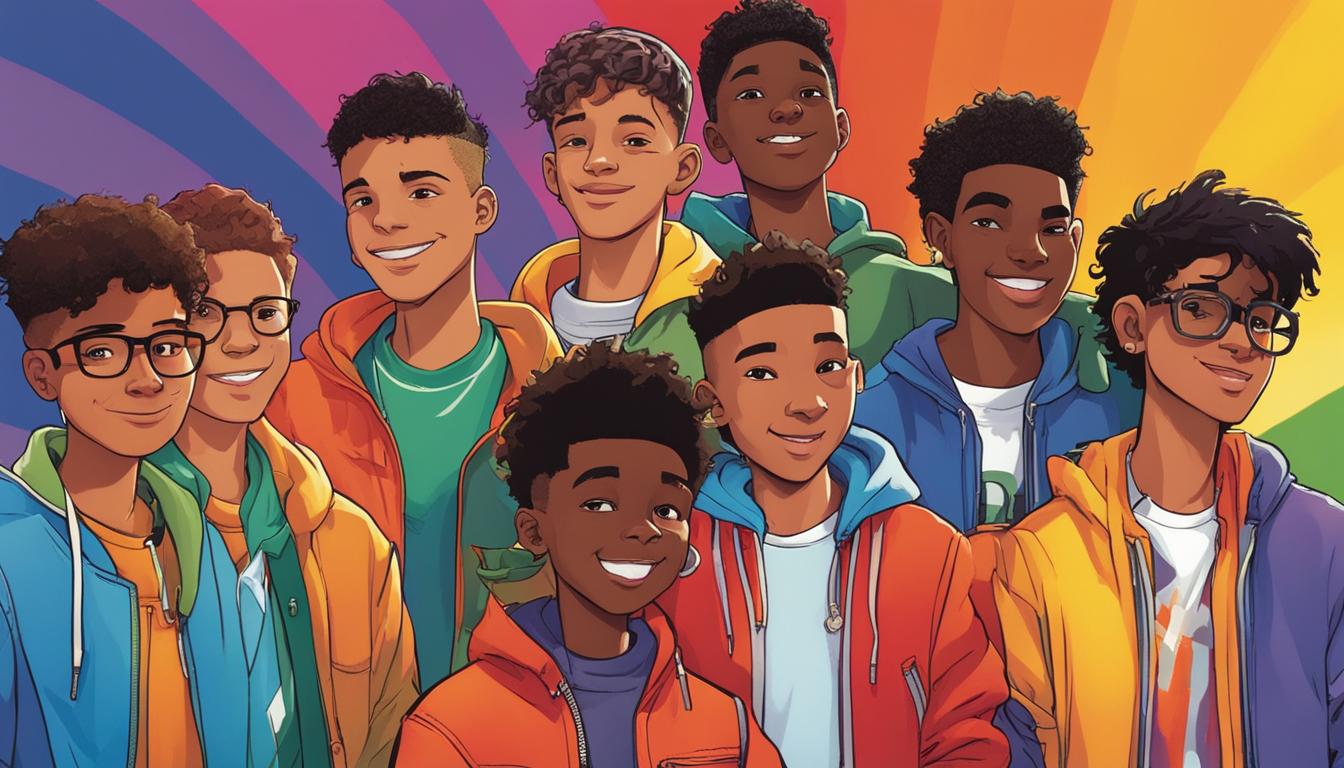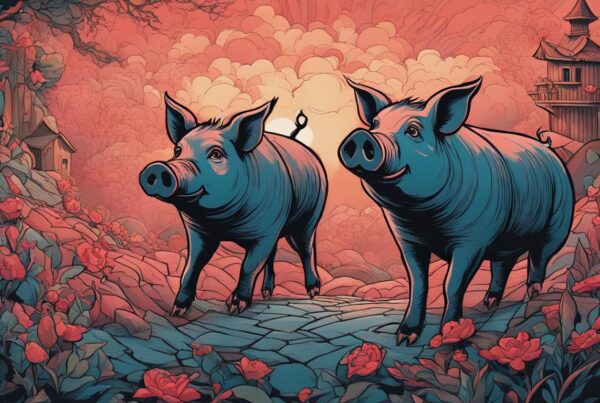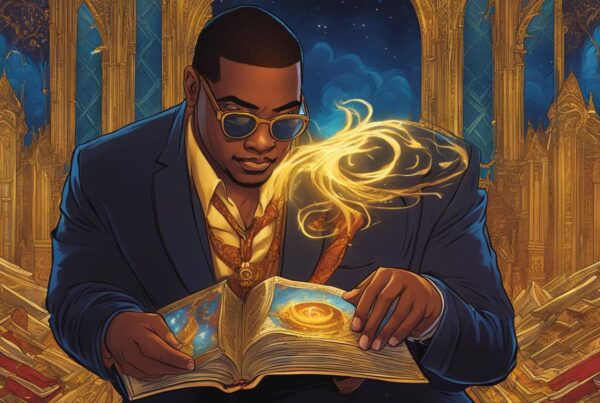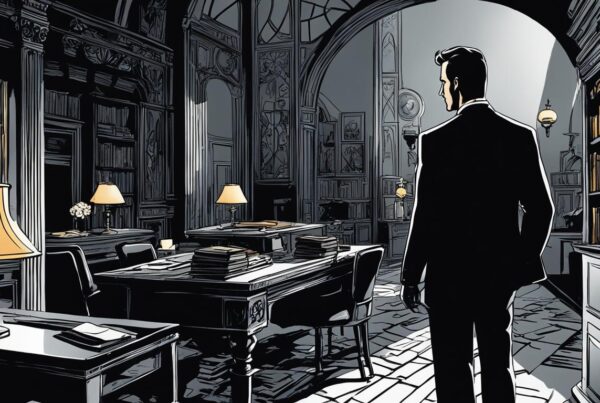Rainbow Boys by Alex Sanchez is a groundbreaking LGBTQ+ novel that follows the self-discovery and friendships of three high school seniors. The first book in the Rainbow Trilogy, Rainbow Boys explores the complexities of sexuality and identity in a relatable and authentic way.
In this book summary, we will take a closer look at the plot, characters, themes, and cultural significance of Rainbow Boys. Written by Alex Sanchez, an accomplished author in the LGBTQ+ literature community, the novel has made a significant impact and earned critical acclaim since its publication in 2001.
Key Takeaways:
- Rainbow Boys is an LGBTQ+ novel that explores the themes of self-discovery and friendship.
- The book is the first in the Rainbow Trilogy, written by acclaimed author Alex Sanchez.
- Rainbow Boys has made a significant impact, contributing to greater visibility and understanding of the LGBTQ+ community.
- The novel has received critical acclaim and resonated with readers, particularly LGBTQ+ youth.
- Readers interested in LGBTQ+ literature may enjoy other recommended books and series.
About the Author
Alex Sanchez is an award-winning author known for his impactful and culturally relevant LGBTQ+ literature. Born in Mexico and raised in the US, Sanchez draws on his own experiences to create authentic and relatable characters and stories.
Sanchez earned his Master’s in Guidance and Counseling from the University of Houston, working as a counselor before publishing his first book. In addition to the Rainbow Trilogy, he has written several other books, including The God Box, Bait, and The Sword of the Spirits.
Sanchez’s works have been recognized by various organizations, including the American Library Association, Lambda Literary Foundation, and the National Council for Teachers of English. He has also been a keynote speaker and panelist at multiple literary events and conferences, sharing his insight and experience with other writers and readers.
“I write about young people who are trying to find themselves and who are trying to figure out what the world is about, and who often look to literature for guidance and inspiration. I try to empower them with my writing.”
Introduction to Rainbow Boys
Discover the captivating first book of the Rainbow Trilogy, Rainbow Boys. Written by Alex Sanchez, this LGBTQ+ novel takes readers on a journey of self-discovery and friendship.
The plot follows three high school seniors, Jason, Kyle, and Nelson, as they confront their sexual identities and navigate the challenges of coming out.
The setting is modern-day America, with the majority of the story taking place at high school, parties, and the characters’ homes.
The main characters include Jason, a popular athlete struggling with his attraction to other men; Kyle, a talented musician who fears losing his friends and family if he comes out; and Nelson, an openly gay student who faces discrimination and bullying.
Rainbow Boys sets the stage for an emotional and thought-provoking exploration of identity and acceptance.
Main Characters
Rainbow Boys focuses on the stories of its three main characters: Jason Carrillo, Kyle Meeks, and Nelson Glassman. Each of them faces unique challenges as they come to terms with their sexual identities.
| Character | Description |
|---|---|
| Jason Carrillo | A popular high school athlete who struggles with his attraction to other men, fearing the repercussions it could have on his social status and relationship with his conservative father. |
| Kyle Meeks | A talented musician who is openly gay, but still coming to terms with his own self-acceptance and the strains it places on his relationship with his boyfriend, Jason. |
| Nelson Glassman | A flamboyant and confident student who is out and proud about his sexuality, but who grapples with unrequited feelings for his straight best friend, Kyle. |
As the novel progresses, readers witness the characters’ struggles with their sexual identities and relationships, as they navigate the challenges of homophobia, self-doubt, and social expectations.
Plot Summary
Set in Washington DC, Rainbow Boys tells the story of three high school seniors, Jason Carrillo, Kyle Meeks, and Nelson Glassman, who are struggling to come to terms with their sexual identities amidst societal pressures and personal doubts. Rainbow Boys follows their journey as they confront their fears and prejudices to find acceptance and love.
The story starts with Jason, a star athlete, who is haunted by the fear of being rejected by his family and friends if he comes out as gay. Kyle is an aspiring writer, who is smitten by Jason but is still undecided about his own sexuality. Nelson, who is openly gay, faces bullying and exclusion from his peers.
As the three boys struggle with their individual challenges, their paths cross, and they form a bond of friendship that helps them find the courage to be true to themselves. Along the way, they face several obstacles, including discrimination, harassment, and family conflicts.
The plot takes several unexpected turns as the boys navigate through their emotions and relationships. Jason’s secret relationship with Debra, a popular girl, creates a complex web of lies and guilt that threaten to destroy his newfound sense of self-acceptance. Kyle’s attraction to Jason puts their friendship at risk, as he struggles with his feelings and fears of rejection. Nelson’s search for love and belonging leads him to make a risky decision that could have severe consequences.
“You can’t judge someone by just their sexuality. It’s just one facet of who they are.”
The novel reaches a dramatic climax in the school’s Gay-Straight Alliance’s dance, where each boy’s story culminates in a powerful and poignant moment of truth and acceptance.
In the end, Rainbow Boys offers a heartfelt and inspiring message of hope and love that resonates with readers of all ages and backgrounds.
Themes Explored
In Rainbow Boys, Alex Sanchez tackles several themes relevant to the LGBTQ+ experience.
| Theme | Description |
|---|---|
| Acceptance | The novel explores the journey of each character as they come to accept their sexual identities, highlighting the importance of accepting oneself and others for who they are. |
| Self-discovery | The characters embark on a journey of self-discovery as they explore their sexuality and navigate their feelings, leading to a greater sense of self-awareness and understanding. |
| Friendship | The bonds of friendship are a central theme throughout the novel, highlighting the importance of supportive relationships and the role of friends in the coming-out process. |
| Societal Expectations | Rainbow Boys examines societal expectations surrounding masculinity and sexual identity, as the characters struggle with their own identity while also trying to meet societal expectations. |
The exploration of these themes reinforces the significance of diversity, acceptance and friendship in one’s life. Sanchez’s novel serves as an important reminder of how we should treat people with compassion and respect, free from judgments and biases that are founded on gender or sexuality.
LGBTQ+ Representation
The LGBTQ+ representation in Rainbow Boys is both authentic and diverse, showcasing the experiences of young people grappling with their sexual identities. The novel’s characters represent a range of sexual orientations and gender identities, challenging traditional gender norms and heteronormativity.
The depiction of LGBTQ+ characters in literature is critical, as it provides opportunities for greater understanding, empathy, and acceptance. Authentic storytelling empowers readers to see themselves reflected in the characters and themes, fostering a sense of solidarity and validation.
“Books about us should be written by us,” states award-winning author Malinda Lo, emphasizing the importance of LGBTQ+ representation in literature.
Representation in literature can also serve as a lifeline to young people struggling to come to terms with their identities. Rainbow Boys, in particular, has had a profound impact on LGBTQ+ youth, offering them a sense of community and understanding.
Overall, Rainbow Boys stands as a testament to the power of diverse and authentic storytelling in advancing LGBTQ+ representation in literature.
Critical Reception
The publication of Rainbow Boys marked a turning point in LGBTQ+ literature, earning both praise and criticism for its groundbreaking portrayal of teenage sexuality and identity. Many readers hailed the novel for its nuanced characters, powerful themes, and relatable storylines.
Reviewers also praised the book’s frankness and emotional depth, with Booklist stating, “Sanchez writes with stunning honesty and moving sensitivity about the coming-of-age struggles of three gay high school seniors.” Additionally, Publishers Weekly called the novel “an engaging and ultimately hopeful read,” while School Library Journal lauded its “emotionally charged realism.”
However, not everyone was pleased with the novel’s content. Some readers felt that Rainbow Boys was too graphic, while others criticized it for not representing a wider range of LGBTQ+ experiences. Despite the criticisms, Rainbow Boys remains a groundbreaking work in LGBTQ+ Young Adult literature that has opened doors for more diverse representation.
Rainbow Boys continues to be praised for its literary value and its contributions to LGBTQ+ literature. It has helped to create a more inclusive representation of the community, while expanding readers’ perspectives and promoting empathy and understanding.
Impact and Cultural Significance
The impact of Rainbow Boys on LGBTQ+ literature cannot be overstated. Alex Sanchez’s groundbreaking book has contributed to greater visibility, understanding, and acceptance for the community. By telling the story of three young men struggling with their sexual identities, Sanchez tackles important themes of acceptance, friendship, and self-discovery that resonate with readers of all backgrounds.
Since its publication in 2001, Rainbow Boys has become a beloved classic in the LGBTQ+ canon, inspiring countless readers to embrace their true selves and find acceptance. Its cultural significance is also evident in its awards and recognition, which include the Lambda Literary Award and a place on the American Library Association’s list of Best Books for Young Adults.
This novel has earned a special place in the hearts of LGBTQ+ youth, who have found in its pages a reflection of their own journeys and struggles. Through its powerful storytelling and authentic representation, Rainbow Boys has brought comfort, validation, and a sense of community to countless readers.
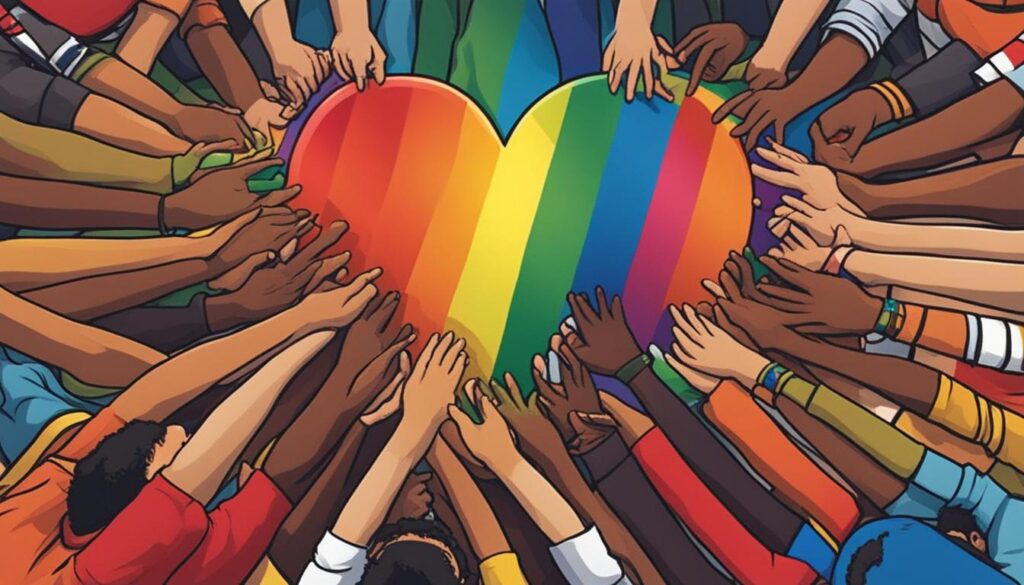
Sequels and Continuation of the Rainbow Trilogy
What happened next in the Rainbow Trilogy? Fans of Alex Sanchez’s LGBTQ+ novel series can continue the journey of self-discovery and friendship with Rainbow High and Rainbow Road, the second and third books in the trilogy, respectively.
Rainbow High follows the story of Jason, Kyle, and Nelson as they navigate their senior year of high school, facing new challenges and relationships. The sequel retains the authentic and emotional storytelling that made Rainbow Boys a beloved classic of LGBTQ+ literature.
Rainbow Road concludes the Rainbow Trilogy, as the three friends enter adulthood and strive to stay connected and true to themselves, despite the distances and difficulties that life brings. With its themes of acceptance, love, and empowerment, the Rainbow Trilogy continues to inspire and resonate with readers of all ages and backgrounds.
LGBTQ+ Recommended Reading
If you enjoyed Rainbow Boys and are looking for more LGBTQ+ literature, check out our recommended reading list.
| Book Title | Author | Genre |
|---|---|---|
| Less | Andrew Sean Greer | Literary Fiction |
| A Single Man | Christopher Isherwood | Literary Fiction |
| Aristotle and Dante Discover the Secrets of the Universe | Benjamin Alire Sáenz | Young Adult Fiction |
| The Price of Salt | Patricia Highsmith | Romance |
| Fun Home: A Family Tragicomic | Alison Bechdel | Comics and Graphic Novels |
These books span various genres, including literary fiction, young adult fiction, romance, and comics and graphic novels. Each provides a unique and compelling story celebrating the LGBTQ+ experience and community.
Impact on LGBTQ+ Youth
Rainbow Boys has had a significant impact on LGBTQ+ youth, resonating with readers and providing representation in literature for those who may not see themselves reflected elsewhere. Through Alex Sanchez’s powerful storytelling, readers have been able to explore issues of sexuality, acceptance, and friendship in a relatable and meaningful way.
The novel has helped to create a safe space for LGBTQ+ youth, allowing them to feel seen and understood. It has provided support and validation, helping individuals to embrace their true selves and find their place in the world. The impact of Rainbow Boys is evidenced by the numerous positive reviews and awards the book has received over the years.
“Rainbow Boys teaches us that we can find strength in our differences and share that strength with others. Sanchez’s writing is a reminder of the importance of compassion, understanding, and acceptance in our lives.” – Michelle, LGBTQ+ youth
Books like Rainbow Boys play an influential role in shaping young minds and fostering understanding and acceptance. It is vital that young people see themselves and others represented authentically in literature, as it can have a profound impact on their self-esteem and worldview.
Cultural Context and Historical Background
The release of Rainbow Boys in 2001 came at a critical time in the fight for LGBTQ+ rights and acceptance in America. The novel’s publication coincided with a number of social and political developments that would ultimately shape the cultural landscape and attitudes towards sexuality.
In the late 1990s and early 2000s, the LGBTQ+ rights movement was gaining momentum across the United States. The first statewide recognition of same-sex relationships occurred in Hawaii in 1993, and the first civil unions were established in Vermont in 2000. However, LGBTQ+ individuals still faced widespread discrimination and bigotry, and same-sex marriage remained illegal in all states.
It was in this environment that Alex Sanchez’s Rainbow Boys was published. The novel tackled important and sensitive themes with honesty and nuance, providing readers with a poignant depiction of the challenges faced by LGBTQ+ youth. It was a groundbreaking work that helped to increase visibility and understanding of the LGBTQ+ experience.
“Rainbow Boys offers readers a glimpse into the world of LGBTQ+ youth and the struggles they face in coming to terms with their sexual identities. It is an important work that shines a light on a complex and often misunderstood topic.” – The New York Times
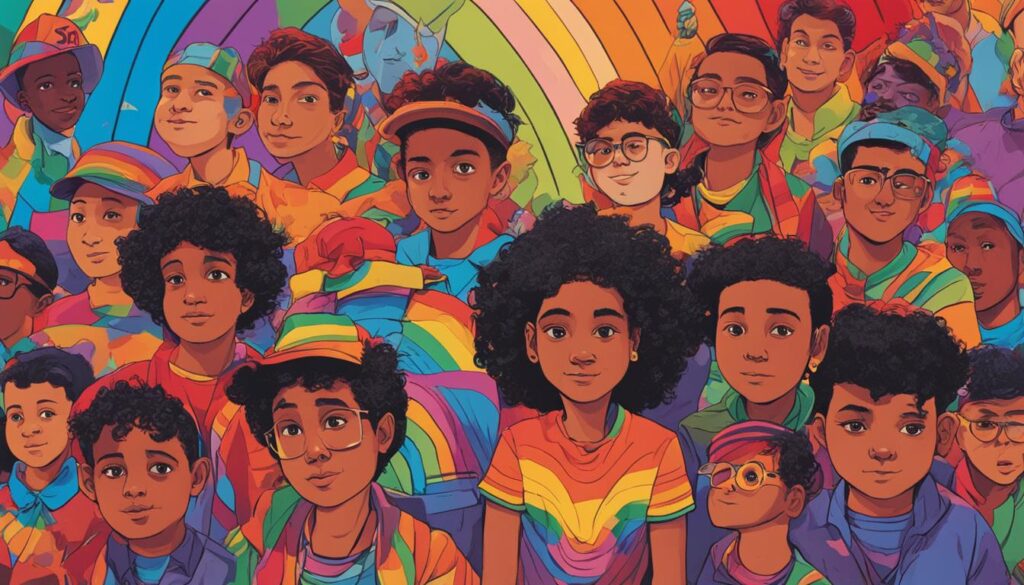
The historical significance of Rainbow Boys lies not only in its portrayal of LGBTQ+ characters but also in its place within the canon of young adult literature. At the time of its release, there were few books available for young readers that addressed LGBTQ+ issues in a sensitive and positive way. Rainbow Boys helped to fill this gap and opened the door for a new wave of LGBTQ+ literature aimed at young adults.
| Year | Event |
|---|---|
| 1992 | In Wisconsin v. Mitchell, the U.S. Supreme Court rules that hate crimes based on race, ethnicity, or sexual orientation are punishable by additional damages and penalties. |
| 1993 | The Hawaii Supreme Court rules that denying same-sex couples the right to marry is discriminatory, marking the first statewide recognition of same-sex relationships. |
| 2000 | Civil unions are established in Vermont, giving same-sex couples many of the legal rights and protections afforded to married couples. |
| 2001 | Alex Sanchez’s Rainbow Boys is published, helping to increase visibility and understanding of the LGBTQ+ experience in young adult literature. |
| 2015 | The U.S. Supreme Court legalizes same-sex marriage nationwide in the landmark case of Obergefell v. Hodges. |
Thanks in part to works like Rainbow Boys, the landscape of LGBTQ+ literature has evolved significantly in the years since the novel’s publication. Today, there are countless books available for young readers that explore LGBTQ+ themes in a nuanced and empowering way, helping to promote greater understanding and acceptance of all individuals.
Conclusion
Overall, Rainbow Boys by Alex Sanchez is a must-read for anyone looking for a compelling story of self-discovery and friendship. Through its vivid characters and powerful themes, the novel captures the experiences and challenges faced by LGBTQ+ individuals in a way that is accessible and impactful.
The book’s critical reception and enduring cultural significance are testaments to its importance in LGBTQ+ literature and beyond. It is a powerful reminder of the transformative power of representation and diverse storytelling, and a valuable resource for anyone looking to better understand the LGBTQ+ community.
Whether you are a long-time fan of the Rainbow Trilogy or discovering it for the first time, Rainbow Boys is a novel that will stay with you long after you finish reading it.
FAQ
Who is the author of Rainbow Boys?
Rainbow Boys is written by Alex Sanchez, a talented author known for his LGBTQ+ novels.
What is the Rainbow Trilogy?
The Rainbow Trilogy refers to a series of books written by Alex Sanchez, with Rainbow Boys being the first installment.
Can you provide a brief summary of Rainbow Boys?
Rainbow Boys follows the journey of three high school boys as they navigate self-discovery and friendship while coming to terms with their sexual identities.
Who are the main characters in Rainbow Boys?
The main characters in Rainbow Boys include Jason, Nelson, and Kyle, each with their own unique backgrounds and stories.
What is the plot of Rainbow Boys?
Rainbow Boys dives into the complexities of the characters’ lives, depicting their struggles, triumphs, and personal growth as they confront societal expectations, relationships, and acceptance.
What themes are explored in Rainbow Boys?
Rainbow Boys explores themes of acceptance, self-discovery, friendship, and the societal pressures faced by LGBTQ+ individuals.
How does Rainbow Boys contribute to LGBTQ+ representation?
Rainbow Boys offers authentic representation of LGBTQ+ characters and experiences, fostering understanding and empathy among readers.
What has been the critical reception of Rainbow Boys?
Rainbow Boys has received praise from readers, reviewers, and the LGBTQ+ community for its compelling storytelling and realistic depiction of LGBTQ+ issues.
What impact does Rainbow Boys have on LGBTQ+ youth?
Rainbow Boys has had a positive impact on LGBTQ+ youth, providing them with relatable characters and narratives that help them feel seen and understood.
Are there sequels to Rainbow Boys?
Yes, Rainbow Boys is the first book in the Rainbow Trilogy. There are subsequent books that continue the story of the characters and their journey.
Can you recommend other LGBTQ+ books to read?
Absolutely! Check out our curated list of LGBTQ+ recommended reading for more books that celebrate the LGBTQ+ experience.
How does Rainbow Boys relate to the cultural context and historical background?
Rainbow Boys explores the LGBTQ+ rights movement, societal attitudes towards sexuality, and the significance of its publication in contributing to greater visibility and acceptance for the community.
